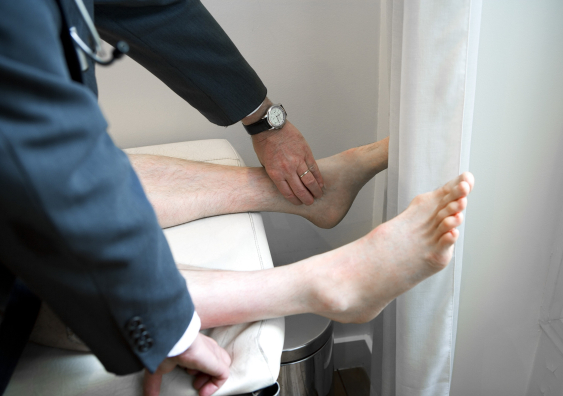Dissolvable stent effective for lower leg artery disease treatment: clinical trial
The new intervention keeps the blood vessel open and reduces the risk of amputation.
The new intervention keeps the blood vessel open and reduces the risk of amputation.

Maddie Massy
UNSW Medicine & Health
+61 2 9348 1936
m.massywestropp@unsw.edu.au
Patients with blocked lower leg arteries could soon have access to a new type of stent called Esprit BTK. In a phase 3 randomised clinical trial (RCT) led by UNSW researchers, Esprit BTK was shown to be more effective than the current standard procedure. For patients given Esprit BTK, the treated blood vessel was more likely to remain open, reducing the need for limb amputation.
The clinical trial findings were recently published in the New England Journal of Medicine. Conjoint Associate Professor Ramon Varcoe, from UNSW Medicine & Health and the Prince of Wales Hospital, is the first author of the paper and one of the three global principal investigators.
A/Prof. Varcoe is hopeful that patients at the Prince of Wales Hospital could gain early access to Esprit BTK before the device is approved for widespread use in Australia by the Therapeutic Goods Administration (TGA). This would expand the treatment options for patients suffering from peripheral artery disease (PAD).
PAD involves the build-up of plaque in the peripheral arteries, which carry blood away from the heart to the limbs. This causes narrowing of the peripheral arteries, which in severe cases leads to chronic limb-threatening ischaemia (CTLI). Patients with CTLI experience severe pain, gangrene, non-healing ulcers and may require limb amputation, with poor survival rates.
“The prognosis after amputation is worse than most cancers,” says A/Prof. Varcoe, who is a clinical academic and vascular surgeon.
Read more: Pinpointing the cause of a mysterious heart disease affecting women
PAD is estimated to affect over 200 million people globally. There is no national data for Australia, but according to the Australian Institute for Health and Welfare, PAD was the primary cause of almost 60,000 hospitalisations in 2020-21. PAD most commonly affects the lower limbs.
When PAD occurs in the blood vessels below the knee, the current standard of care is balloon angioplasty, a procedure that has been around since the 1950s. During the procedure, a tiny balloon is inserted into the blocked artery, then inflated to widen the opening and increase blood flow.
“Currently, we use angioplasty but this has no mechanical scaffolding properties and usually doesn’t stay open very long,” A/Prof. Varcoe says.
In many cases, after balloon angioplasty, the treated blood vessel becomes narrower and the balloon doesn’t stay inflated for long enough. This results in the blood vessel becoming blocked again over time.
There is potential to use stents – small scaffolds which could more effectively hold the arteries open – for below-the-knee PAD. However, no such devices have been approved yet for this purpose, with several failed clinical trials.
That’s why A/Prof. Varcoe and his colleagues, together with US medical devices company Abbott, have developed Esprit BTK for the treatment of blocked arteries below-the-knee.
Esprit BTK is a mechanical scaffold inserted into blocked lower leg arteries. The scaffold is made from poly-l-lactic acid, which safely dissolves in the body over 18-24 months. This is a useful quality as the artery only needs to be held open for a limited time to restore blood flow and resolve the blockage.
The scaffold is also coated with everolimus, a drug that prevents the blood vessel from narrowing.
“The Esprit scaffold gives mechanical support to the recently opened artery, it delivers a drug to the blood vessel wall that prevents renarrowing, and then it dissolves, leaving nothing behind to irritate the blood vessel and induce scar tissue formation,” A/Prof. Varcoe says.
“It also avoids burning bridges should the patient require bypass surgery in the future.”
A/Prof. Varcoe was the first person to insert the scaffold into a human and conducted the Phase 1 clinical trial with his colleagues, before becoming one of the principal investigators for the later-stage clinical trials.
The Phase 3 RCT for Esprit BTK involved 261 patients globally with blocked lower leg arteries, who were at risk of requiring limb amputation. These patients were treated with either balloon angioplasty or Esprit BTK.
At the one-year timepoint after treatment, the researchers found that Esprit BTK was much more effective at keeping the artery open, which is critical for preventing the need for limb amputation. About 75 per cent of the Esprit BTK group experienced this outcome, compared to 44 per cent of the balloon angioplasty group.
Read more: Drug that targets scar-like tissue in tumours shows promise for pancreatic cancer
In terms of patient safety, there was little difference between the two treatments. Serious adverse events occurred in 3 per cent of patients in the balloon angioplasty group and 2 per cent in the Esprit BTK group.
“This is the first positive RCT in this space and it gives us an effective tool to save limbs in this group of patients who are often very sick,” A/Prof. Varcoe says.
Following the success of the Phase 3 RCT, the researchers and Abbott Laboratories are working to make Esprit BTK available for patients in multiple countries.
Esprit BTK will be submitted to the Food and Drug Administration (FDA) for approval in the US initially, followed by further submissions in Europe, Japan and Australia. The researchers are also working through the TGA Authorised Prescriber Scheme in an attempt to gain early access for patients at the Prince of Wales Hospital.
“Once approved, I expect it will become the standard of care,” A/Prof. Varcoe says.